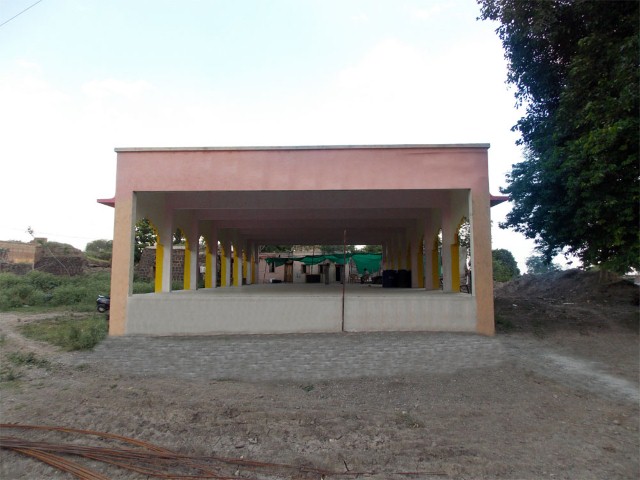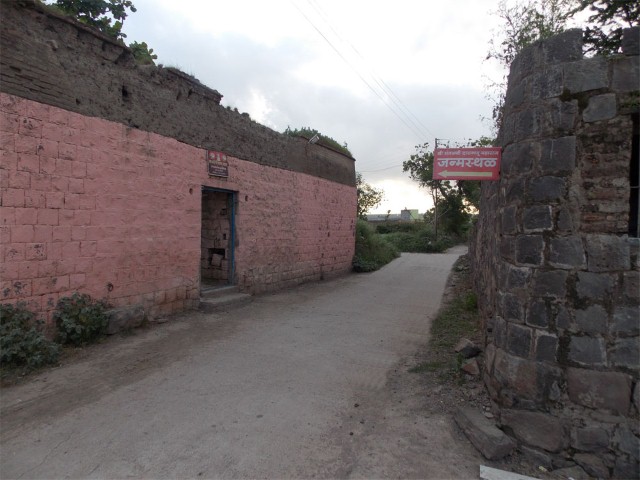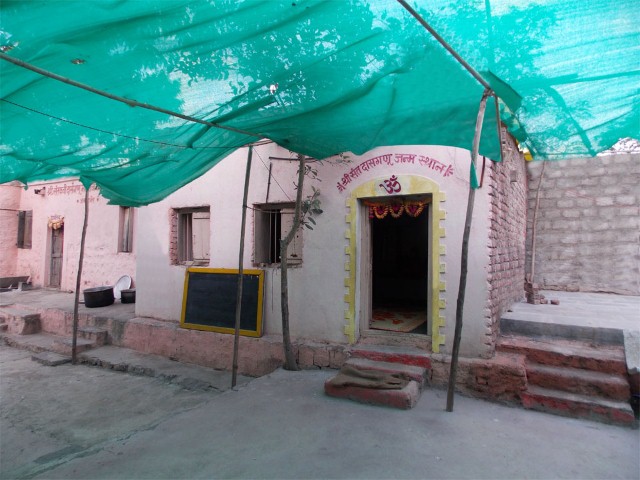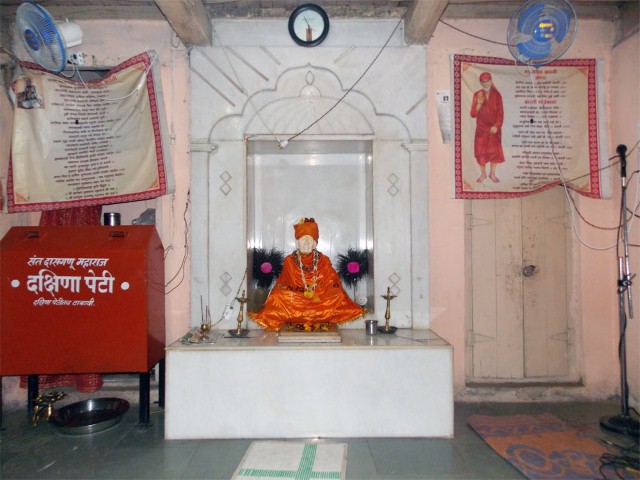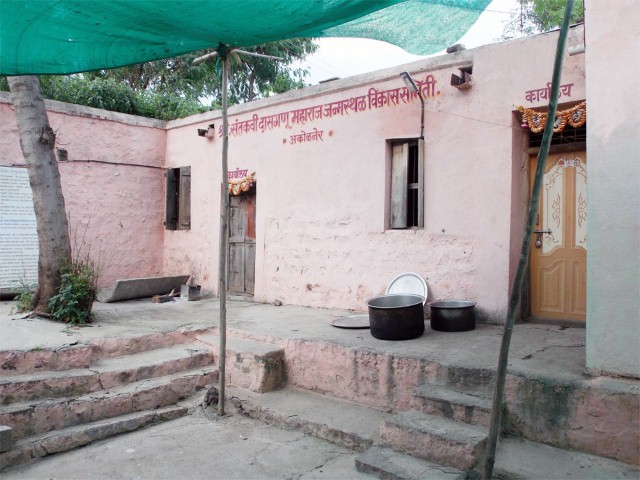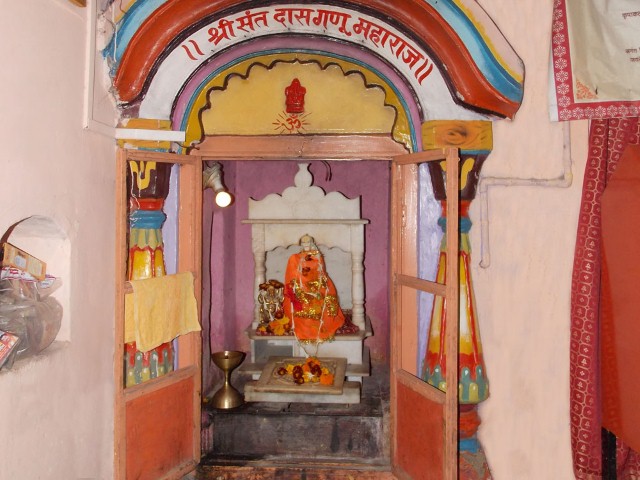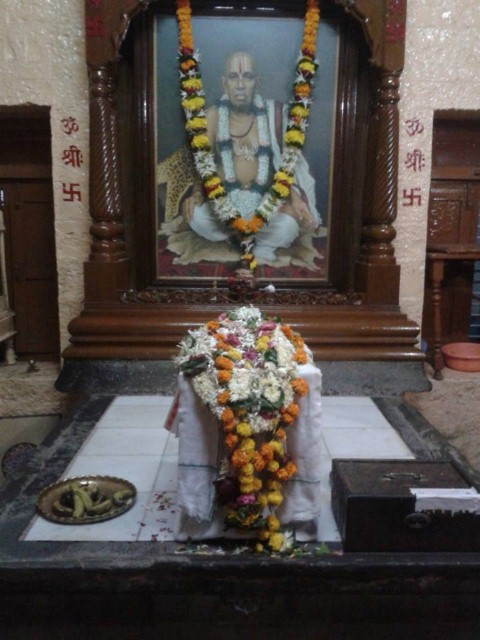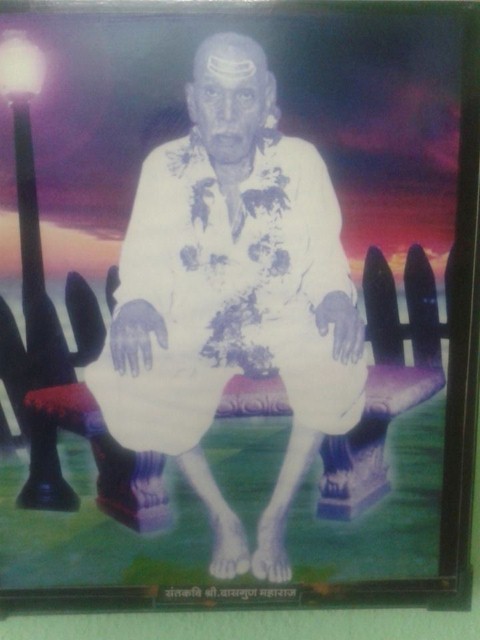| ||||||||||||||||||||||||||||||||||||||||||||||||||||||||||||||||||||||||||||||
Shri Dasganu Maharaj was born on 6th January, 1868 (Paush Shuddh Ekadashi, shake 1789) to Late Smt.Savitri and Shri.Dattatreya Sahasrabuddhe at Akolner that is 14 Kms away from Ahmednagar. His birthplace was preserved at Dabholkar wada at Akolner in the Ahmednagar District of Maharashtra. His original name was Ganapt Rao Dattatreya Sahasrabuddhe. Das Ganu had two brothers namely Ram and Laxman and one Sister by name Dwaraka. During Childhood young Dasganu refused to have his mother's milk and used to cry very much. So, his grandmother prayed sincerely for her first grandchild's wellbeing to their family deity, Lord Khandoba. It proved miraculous and young Dasganu started taking mother's milk and stopped crying. He was named as "Narayan" during the naming ceremony. But Dasganu's grandfather Eknathpant was not happy with the name "Narayan" and hence he renamed the child as "Ganapati" as the child was quite healthy and having a belly as large as that of Lord Ganapati. Das Ganu by birth had very powerful imagination and mastery over his mother-tongue Marathi. He was the pet child of his Grandparents Smt.Saraswati and Shri.Eknathpant. Ganesh's grandfather from maternal side Late Shri.Appaji Dabholkar and his son Kashinathpant were very highly spiritual and thus influenced the child Ganesh deeply. During the later years, Dasganu praised them in his devotional poems.
Insight on Das Ganu Maharaj by Dr.Vinny Chitluri - Video Courtesy: Shri.Nikhil Kripalani Ganesh did not progress well in his early education due to pampering of his grandparents and others in the joint family. Even after crossing his 7th year, he was reluctant to attend school and concentrate on his studies. He used to play lot of mischiefs. His parents then decided to perform his thread ceremony at their home in Ahmednagar city. Accordingly his thread ceremony was performed in the year 1876 when he attained the age of 8 years. But even then there was no change in his indisciplined life style. Shri.R.B.Limaye was appointed as a teacher to teach Ganesh in his reading, writing and Mathematics. The teacher was very strict and punished young Ganesh whever he disobeyed them. This had a negative effect on the senstive mind of Dasganu. Finally, he was made to join a local school for getting early training in various subjects. But even here Ganesh used to play mischief and irregular in attending the classes. Once when Ganesh was studying in third standard, a special lecture by Smt.Taibai Avachat was organized on the subject of equality of men and women. The speaker Taibai took the side of women and charged males that they do injustice to women. This irked young Ganesh. Hence, immdiately after the school was over, he arranged the meeting of the students outside the school and made a mockery of the speech made by Smt.Taibai. The students enjoyed the joke made by Ganesh. But the school management took a serious note of this act and debarred Ganesh from the School. Hence, Ganesh started disliking the school education system that was prevalent in the late 19th century. Hence, his uncle Shri.Janardanpant who was the mamaltdar of Sangamner decided to educate Ganesh privately and accordingly one Shri.Thakkar, a graduate in English was appointed to train Ganesh around the year 1886-1889. But here too Ganesh failed to develop interest in learning subjects of the school. Instead his sensitive and poetic mind was diverted towards local Tamasha Folk Theatres where his imagination could catch up with the seductive poetry. One fine day he himself started composing in Marathi language, "Lavani", the popular musical poetic form. Very soon he became very popular amongst the Tamasha artists who enjoyed this young poet's vibrant, sensitive songs which was suitable to the performing art which was popular amongst the elite class of the society. This unexpected turn of events in his creative life not only spoiled Dasganu's education but also made his uncle unhappy. His uncle was interested to graduate him and then send him to England for ICS. Later in his life Dasganu repented very much that he could not take advantage of the opportunities given to him by his uncle for educating him. Dasganu started composing rual and seductive Marathi poetry of good quality. He started living in the company of Tamasha people too. But fortunately he lived very honest and innocent life untouched by the lust and corruption of the lower class people involved in the Tamasha Art. As Ganesh could not go ahead in his formal education, his grandfather decided to send him to Baroda, Gujarat where Ganesh's material uncle, Shri.Balwant Sadashiv Godbole, was an officer in the State Administration. He managed to engage Ganesh in a clerical job under his control. But Ganesh, who as a very straight foward person could not adjust himself there and came back to his home town Ahmednagar. The only benefit of going to Baroda was that Ganesh was able to learn and converse in Gujarathi language. This helped Dasganu in future as he wrote some songs in Gujarathi in his famous Akhyanas or Saint Biographies in Marathi. His Parents and Grandparents thought of getting him married so that he could settle in life. Accordingly, in 1891 at the age of 23, he was married to Saraswati Bai alias Bayya, daughter of a Jahagirdar Shri.Narayanrao Ranade, of Jamkhed Taluk of Ahmed Nagar District. But even after his marraige, Ganesh could not settle in his life. He again resorted to indisciplined life without concentating on education or job. Hence, the elders in the family started blaming him for not engaging himself in any job or business and for not earning any money. Once it so happened that his uncle Shri.Janardhan Pant's wife insulted him very badly and the self respected Ganesh left home declaring that he would not return home and earn his livelihood outside on his own. After leaving his home at Ahmednagar, Dasganu came to the shelter of Vishnupant Misal who was a family friend of Shri.Dasganu. He gave him full support and sympathized with his sorry state of affairs. Shri.Dasganu has mentioned this timely help by Shri.Vishnupant Misal in several of his books with a very deep sense of gratitude. Dasganu seriously started searching for a job. One day while he was walking along the street, he met the European Police Superintendent, Mr.Kennedy who knew the Sahasrabuddhe family very well. He enquired Dasganu as to where he was going and what he was doing. Dasganu narrated his story in detail and told him that he was badly in need of a job. Mr.Kennedy offered him the job of a Constable in the Police Department. Ganesh immediately agreed and requested him to post him out of Ahmednagar City. Thus Ganesh Dattatreya Sahasrabuddhe was appointed the very next day as a Police Constable at Shrigonde Village in Ahmednagar District. He was allotted a buckle bearing No.727 and was offered a monthly salary of Rs.9/- in 1892 when he was just 25 years. Young Ganesh immediately went to the police headquarters and took the order and reported for duty at Shrigonde. This was the turning point in the life of Dasganu. During his 11 years of tenure in the police department, he learned many things and proved his qualities of head and heart. Even though his family members were not happy about his joining the police department, they could not change Ganesh's mind. Shrigonde village was famous for many hindu temples and Saints. It was also famous for Tamasha Art. Ganesh started composing seductive poetry called "Lavni" for the performing artists of Tamasha. He also wrote a play in Marathi titled "Manyurava". He staged this play with the financial assistance of his colleagues in the Police Department. Dasganu met his Spiritual Guide or Guru Shri.Waman Shastri Islampurkar in this very place. Dasganu engrossed himself in carrying out his police duty and compose songs for the Tamasha Company. Shri Dasganu's Marathi poetry during this period was full of his youthful strong source of imagination and mastery over expression. Because of his poetry, Dasganu attracted both friends and foes in equal numbers. But Dasganu was fearless and did not care for anybody. His contemporaries like Shri.Dattopant Khair and Shri.Madhavrao Adkar always praised Dasganu even after they left Shrigonde. His another muslim friend Shri.Kayatkhan Sardarkhan used to speak good about Dasganu and used to say that Shri.Dasganu not only lived a life of honesty and moral discipline but was also successful in influencing others around him to lead such a life. Thus, the substandard job of police constable and vulgar hobby of composing Lavni's for Tamasha did not affect his strong faith in God. All the colleagues and friends of Dasganu used to praise him for his clean character and kind heart. The Tamasha Artists considered Dasganu has their bread giver and real Guru or guide in every respect. Dasganu's friends of this time Shri.Rama Gondhali and Shri.Tulsiram Dalvi have narrated this fact to Shri.Ananth Damodar Athavale. Shri.Dasganu was given the duty of attending on the scholar Shri.Wamanshastri Islampurkar who came to Shrigonde to collect information about the old sanskrit books available there in the house of Shri.Bhanage. Shri.Dasganu was not at all serious about this duty. Shri.Wamanshastri could not come to Shrigonde on the scheduled day. Hence, Dasganu made fun of of Wamanshastri's visit while having lunch at his boarding. Shri.Wamanshastri arrived on the next day and joined Dasganu when he was having his lunch. Dasganu saw this scholar but did not know who he was. In the evening when he met this Scholar and Officer, Dasganu was surprised and felt sorry for the derogatory remarks made on the scholar while staying at the boarding. From that day onwards Dasganu started attending to the duties of Shri.Wamanshastri during his search of the old sanskrit literature he found at the house of Shri.Bhanage. Wamanshastri was pleased with Dasganu's honesty and polieness. At the same time, Shri.Dasganu was also impressed by the disciplined work of the scholar. Everyday after finishing his research work, Wamanshastri used to read the holy scripture "Shreemat Bhagawant Puranam" before going to bed. Dasganu once saw that when the scholar was reading the book, tears rolled down on his cheeks. At that moment itself, Dasganu decided to request Wamanshastri to become his spiritual guide or Guru. When Wamanshastri completed his work at Shrigonde and was about to leave, he called Dasganu and offered him some gift in appreciation of his service. But, Dasganu while humbly refusing to take the material gift requested the scholar to accept him as his disciple and give initiation. In the beginning, Wamanshastri refused to accept Dasganu as his disciple. But when Dasganu inisted and politely pleaded to accept him as his disciple, Wamanshastri accepted him as his disciple and became his spiritual guide. Wamanshastri gave Dasganu a Gurumantra or Divine order on the leaf of holy bhel tree and asked him to strictly follow the discipline of Ramadasi sect and visit the holy abode of Vithoba or Vittala of Phandarpur in the Solarpur District of Maharashtra every year. This was the turning point in the life of police constable Ganesh. After few years, Wamanshastri directed that after his death, Dasganu should accept Shri Sai Baba of Shirdi as his Guru. He also transferred all his Sanskrit Scholarly knowledge to Dasganu and all his material wealth through a 'WILL' before his death at the holy place of Kashi. Wamanshastri had no legal heirs and Shri.Dasganu was the only disciple of him whom he loved very much. He suggested Dasganu to leave his job of a police constable. Shree Dasganu started thinking about this suggestion. But could not leave the job immediately. Dasganu was overwhelmed with the great love of his Guru and he left the legal right over his Guru's material property and handed it over to his Guru's wife as per her desire. He only took the Idol of Panduranga that his guru worshipped daily after taking his Guru's wife's permission. Thus Dasganu showed great selfless discipline. From then onwards everyone used to address him as Dasganu. From Shrigonda Dasganu was trasnferred to Jamkhed. He lead an eventful life here also. He regularly visited Phandharpur despite refusal of leave from his boss. As days passed, his faith in Lord Vittal of Phandarpur became stronger and stronger. The lifestyle and thinking of Dasganu changed dramatically due to the influence of his Guru Shri.Waman Shastri and Vittal of Phandharpur. Wamanshastri took Samadhi on the auspicious day of Jyeshta Vadya Ekadashi in Shake 1818 or 1896 AD. Soon after the death of his Guru Wamanshastri, Dasganu first he came to Shirdi in the year 1894, he came as the "orderly" of (i.e. constable attending on) Nana Saheb Chandorkar, and whenever Chandorkar visited Shirdi, Ganpat Rao followed him as his Constable, not at all out of faith in, or love for, Sai, but because the master compelled him to. For a very long time, Das Ganu could not appreciate Baba. Up to the end, he could not realise Baba as really Deva i.e. God or as his Guru-Deva, though he had high regard for him and his powers and wrote or sang of him with poetic skill describing Baba as Ramaavara i.e. God, doing lip service. That was why he went to one Islampurkar, a Brahmin Guru, to get his initiation long after he met and dealt with Baba (a step which Baba naturally did not object to when Das Ganu reported the fact to Baba). Anyhow Baba made a remarkable change in the personality of Das Ganu, and Das Ganu also realised how powerful Baba's influence on him was. It has been mostly an unwilling submission on the part of Das Ganu to Sai Baba's yoke. At his earliest advent to Shirdi, Baba noted the nature of Ganpat Rao, and determined that his nature, calling and work should all be totally changed. His nature then was just that of a Police Constable who had hardly any education, but who was very clever in composing Lavani metre songs in Marathi impromptu and in taking a female's part in lewd village dramas. He would put on female dress and dance about in the village and take great pleasure in that achievement. His great ambition was to rise in his profession. The Police Department by itself was not a particularly moral department, and for one who was ambitious to rise in it, one's regard for truth, righteousness, fair dealing, etc. would practically be nil, and scruples, conscience, and character were unwanted hindrances to efficiency. Knowing all their dangers and the real dormant capacity of the man, Baba, from the very beginning, told Das Ganu to give up both his attachments, namely, (1) attachment to the village dance and drama and (2) attachment to the police profession. Chandorkar also pressed this upon Ganpat Rao. With great difficulty Ganpat Rao was weaned away from drama. But as for the profession, he would not give it up. The charm of holding the position of Sub Inspector (Foujdar) and lording it over people was too powerful for him to resist. When Baba said, 'Ganu, you had better give up your police service', Das Ganu replied, 'Baba, let me become a Sub Inspector (for which position I have passed the departmental examination) and hold the appointment for only one year, and thereafter, I will give it up'. Baba replied that he was not going to get the Sub Inspectorship, and that He would see to it that he did not get it. So, Baba's work was to bring in difficulty after difficulty, pressure after pressure to bear upon Ganpat Rao; and Ganpat Rao had innumerable difficulties even without Baba adding to them. For instance, he was fond of touring to distant places of pilgrimage outside his official limits, and he would go without taking the permission of his superiors, which would not be easily granted. On one such occasion, he had gone to a shrine in the "Nizam's State" and was returning. His fellow constables were highly envious of him, and they wanted to pluck his feathers. So, when he was returning to his place, and when he was still on the Nizam's side of the river Godavari, the envious constables were on the other side watching to catch him. He noted this fact and felt that he would surely be dismissed. So, he took up the Godavari water in both of his palms and swore by that "Ganga" water, (as it is called) "Baba, let me escape this time I shall certainly give up my police service". Then he went back into the Nizam's State just a short distance, when lo! And behold, there was proof of Baba's Grace! A village Munsif came to him and told him that certain dacoits were dividing their booty secretly and all that the Village Munsif wanted was a police gentleman with authority to arrest them. So Ganpat Rao went, seized the dacoits and the booty, and proudly returned to his own station on the other side of the Godavari. When questioned how he went out without permission, his reply was that he had gone there for the seizure of dacoits and property—no doubt a falsehood. Thus he not only escaped punishment, but he thought he had a very good chance of rising in his profession. With that thought uppermost in his mind, he was riding past Shirdi to go somewhere. Just as his horse came to Shirdi, and when he did not want to alight there but to pass on without seeing Baba, Baba was on the road and made him alight. Then Baba asked, 'Arre, who is it that swore with a palmful of water in his hand, man?' Then Das Ganu's unabashed reply was, 'What of that? Baba, I am going to resign after all, after I get the Fouzdarship'. Baba said that he would see to it that he resigned, and added 'Until a peg is driven into you, (i.e. pressure becomes painful), you will not obey'. Das Ganu thought there was no further pressure. But pressure came in the year 1898. He along with three other Constables was told off to the duty of capturing a notorious dacoit, who was a terror to the whole countryside, and whose organisation was so vast and wonderful that even the Police Department was in his pay, that is, several of the Police Department were in his pay and he could checkmate their movements. Das Ganu went off to Lonivarni, a place which that famous dacoit, Khana Bhil by name, was visiting. But Khana Bhil was a man of extraordinary abilities. He had shot the other three persons nominated along with Ganpat Rao to catch him, and was determined to deal with Ganpat Rao in the same way. Ganpat Rao disguising himself as a Ramdasi was making use of the village children, learnt from them details about the visits of these robbers, and communicated their movements to the police head-quarters. Suddenly one day Khana Bhil turned up, seized Ganpat Rao by his neck, and said, 'You fellow, you are going to catch me! Do you know that it is Khana Bhil that has now caught you? Now I am going to shoot you, as I have already shot your three companions.' Ganpat Rao was in terror. He was close to Sri Rama's image. He suddenly fell at its feet and, thinking of Sai, said 'Save me. Save me. I will give up all my police efforts'. Khana Bhil was softened. Instead of shooting at both Ganpat Rao and the image, he said, 'I let you off this time. But if you again interfere in my affairs, you are a dead man. Remember.' But the ambition of Ganpat Rao was not to be quenched. Again he got information about Khana Bhil's movements and communicated it to the authorities, with the result that a police force armed with carbines, etc., was sent to surround the hillock on which Khana Bhil and his men had pitched their camp. A fierce battle was fought between the dacoit gang and the police, and Khana Bhil affected his escape. Ganpat Rao knew that his life was doomed. So he went up to Nana Chandorkar, and with his good offices secured a medical certificate and got relieved of his detective duties. Thus for a second time his prayer to Baba to save his life was effectual. Again for a second time he refused to resign. Having so far successfully duped Baba, he thought he was safe. But he hardly knew how many strings Baba had to his bow. The third occasion came and then Das Ganu was in a tight fix. When he was the second in command at the Station, the station Officer left him in charge. And Das Ganu in a lordly way wanted to enjoy his time, and went home leaving a constable in charge of the station. Just at that time, a village munsif had sent up a thoti with a fine collected from some person against whom a warrant had been sent for collection. That money, Rs. 32/-, was left by the thoti with the constable there in charge, without any person to witness. The constable told the thoti that the Station Officer was on leave that no receipt would be granted then, that he might go away, and that the receipt would be sent to the village in due course. So, the poor thoti went away, and the constable swallowed up the money. Ganpat Rao knew nothing of it. However, the authorities finding that Rs. 32/- had not been collected, sent up a second warrant for the collection of the fine. The party showed the receipt from the Village Munsif. The Village Munsif, when asked, said that he had sent the money to Ganpat Rao's Station, and so the enquiring officer came to the Station and asked the Station Officer who pointed out that at the particular time and date when the money came, he was on leave. Then who was in charge? Ganpat Rao was in charge. Ganpat Rao was the man who swallowed that (fine) amount of Rs. 32/- was the conclusion arrived at by the enquiring officer. Ganpat Rao was asked for an explanation. He said he knew nothing. But there was no escaping the fact that money had been sent that day, and was paid at the station as the thoti testified. Then Ganpat Rao, finding that there was not only no chance of his getting the Sub Inspectorship but a good chance of his getting into the jail, solemnly swore to Baba that this time he would positively quit service. He went further and mentioned his willingness to resign to the enquiry officer who, thereupon, made him pay up Rs. 32/-, and then discharged him, taking of course his resignation also. Thus Baba succeeded in making Ganpat Rao quit that service, a service, which would prevent Ganpat Rao from becoming the high spiritual personage that he was subsequently to develop into. Baba used to call him 'Ganu'. When Ganpat Rao came and said, 'I have now left my service; I and my wife have to stand in the streets, as we have no property or income', Baba said, Ganu, I shall provide for you and your family. Baba then asked him to go on with his Brahminical duties, puranic studies, and kirtans at which he was excellent. From the day of his loss of service, i.e. 1904, up to his last breath, Ganpat Rao was never in want either for food or for clothing, and even became the owner of some lands yielding him sufficient support. And in 1919 his wife died issue less, leaving him without any encumbrances. Baba told him to attend to his kirtans. Das Ganu was especially good at kirtans. He had a fine metallic voice, and he was a very able performer of kirtans. He would hold an audience of 2,000 people spell-bound in rapt attention listening to him for six or eight hours, and as he never asked for even one pie and made no collections, his kirtans were popular, and in all his kirtans, he would place Baba's picture next to him and even though his katha was about Tukaram or Namdev or Jnanadev, yet he would always refer to Sai Baba as the living Sam or Satpurusha, i.e. as the present Great Saint, whom it would be a great blessing for people to have darsan of, as the very darsan would purify and benefit the visitor. As soon as his kirtans ended, people started in numbers to go to Shirdi and see Sai Baba. These numbers included high officials of good and great position, as also the poor. Thus he has been the means of sending some tens of thousands of people to Baba. He was justly and rightfully called as Hari Bhakta Parayana Kirtankar. Baba developed his nature and purified it by making him spend his time whenever he went to Shirdi in reading Vishnu Sahasranama at a temple there. Das Ganu Maharaj thus got highly purified and was highly devoted to Baba. His purification and development were marked in various ways, and Baba's favour to him on the spiritual side was so vast and varied that it is impossible to sketch them out. Sai Baba favoured him in addition to relieving him of the two great hampering curses upon him, namely, the dance mania and the Foujdar mania. Baba gave him a special capacity to understand things which others could not ordinarily understand. Baba gave him special hints on special occasions. Two instances where Baba showered His grace on Das Ganu are as below: Das Ganu Maharaj wished to write a Marathi commentary upon Amritanubhava, a famous Marathi religious treatise, and that was considered to be impossible. A pandit told him that he could not possibly catch all the meaning of Jnana Dev, the author, end express it in his work. Das Ganu went to Baba, prayed for and immediately got his blessing. Then, he began to write his explanations of the riddles, seeming contradictions and apparently meaningless dicta of Amritanubhava. He found the heart of the author and brought it out by a number of illustrations. The illustrations he mostly drew from Baba's talk which he heard at Shirdi. So he succeeded in presenting Amritanubhava in such a way as to satisfy even keen critics; and the pandit who first considered it impossible was satisfied that Das Ganu's work was a success. Next Das Ganu was anxious to render even a Sanskrit Upanishad, namely, Ishaavasya Upanishad, into Marathi. This famous Upanishad consists of only 18 verses. It is full of great thoughts and has been considered by Mahatma Gandhi to be peculiarly important. Mahatma Gandhi said that if the whole of Hindu spiritual literature were gone leaving only this Ishavasya Upanishad, the whole of Hindu dharma could be reconstructed with this alone. Though the Upanishad has received such high encomia, it is a very difficult and tough Upanishad even for separation of sentences and phrases in it, and much more for the interpretation of the same. Different writers have adopted widely different courses. Taking even the very first verse, the punctuation varies. Having so many difficulties in the way of his ambition, Das Ganu Maharaj went to Baba. Baba said, 'What difficulty is there in this? You had better go, as usual, to Kaka Dixit's bungalow in Ville Parle. And there that (cooly girl) Malkarni, will give you the meaning'. People would laugh at a great pandit like Das Ganu getting interpretation of an Upanishad from a cooly girl. But all the same Das Ganu went to Kaka's bungalow. He slept there. When he woke up in the morning, he heard a girl (it must be the Malkarni mentioned by Baba, he thought) singing songs in great joy. She was praising some orange coloured silk sari, wondering at its fineness and the beauty of its borders, and the floral embroidery on it. Then he just peeped to see who the songster was. The songster had no sari. She wore a rag which was not silk, nor orange coloured, had no borders and no embroidery. He pitied the girl and got a friend to give her a sari—a small cheap sari. She wore it just one day, and went about enjoying it. But the very following day, she cast it aside, again wore her tatters and again began to sing joyously the song about the orange coloured sari and its beauty. Then Das Ganu understood the Upanishad. He found out that the girl's happiness lay not in the external sari which she had 'thrown away' (tena tyaktena, which means, that being thrown away) but in herself. And Ishavasya Upanishad says the same thing. 'All this world', says the first verse, 'is covered by the Maya of Ishwara. So enjoy bliss, not by having the externals, but by rejecting the externals (Tenatyaktena)'. 'Tena Tyaktena' might mean being content with what God gives you. The girl was happy as she was contented. Thus Baba taught Ishavasya Upanishad to Ganu through a cooly girl. Baba's ways of teaching were and are peculiar and different in the case of different individuals. Das Ganu was helped in numerous other ways, but it is sufficient here to note that Baba gave him the assurance that he would provide for his temporal welfare (Yogakshema) so that he might bravely and calmly start his spiritual career. And Baba kept his word. Baba always keeps his word. Baba thus provided completely for the temporal welfare of a man without any employment and any property. When he thought there was nothing for him to depend upon, Baba provided everything, and Das Ganu had always been very well off temporally. Das Ganu purchased many a properties over a period of time though he transferred them to his adopted son Late Shri.Damodar Vaman Athavale. As for the spiritual uplift, it is impossible to conceive of any greater benefit than wrenching one away from the two great ropes that were dragging Ganpat Rao downwards, namely, the lewd village dramas which Ganpat Rao was playing in and the soul-destroying police work, the wickedness of which would be heightened by the ambition to rise to Sub Inspectorship in double quick time. The way in which Baba responded to prayers and saved him, time and again, from dismissal of punishment would quite suffice to impress the mind of Ganpat Rao with the fact that Baba is omnipotent, is everywhere, watching and attending to his prayers, and is ever looking after him. Baba watched him at every place to which he went and took the appropriate measure that was urgently needed for his welfare.
Damodar Athavale adopted son of Das Ganu Maharaj Baba naturally did his very best for this Das Ganu but, unfortunately, (as we see in the cases of most devotees contacting Baba) there are obstacles due perhaps to poorva karma which prevent one responding in the correct way to such high influence as Baba's. Even after so much of proof of Baba's omnipotence, omnipresence, omniscience, and miraculous help for Ganu's benefit, Ganu did not fully derive the idea that Baba was God. So many others for whom Baba did even less were full of the faith that Baba was God. No doubt Ganu sang of Baba that he was God in fine terms set to music. But Ganu's conviction was superficial and not deep. Das Ganu's faith being very poor and very weak in Baba's divinity, Baba desired to impress on Ganu, His (Baba's) Godhead and to make him and his other disciples realise him (Baba) properly. For that purpose, he exhibited chamatkars, one of which is as follows: On a certain occasion, Das Ganu wanted to go for a bath to the Godavari river which in ordinary parlance is termed 'Ganga' (the Ganges, the most sacred river). That river is four or five miles away from Shirdi, and when Ganu asked for permission to go to "Ganga", Baba answered, 'Why go there? Is not Ganga here?' Ganu felt very much dissatisfied. Ganu was the author of the Aarti song which runs as follows and which was even being sung at Baba's puja. Shirdi Maje Pandharipura Sai Baba Ramaavara.This means 'My Pandharpur or place of pilgrimage is Shirdi, and the God that sanctifies that place (Vittal) is Sai Baba'; that is, Sai is Mahavishnu from whose feet Ganges is perennially flowing. This song is sung by many and at least a few really think in their hearts that Sai Baba is really Maha Vishnu. For, what is Mahavishnu? Maha Vishnu is the protecting form of God. God has three functions, namely, creation, protection, and final withdrawal, which also is a form of protection. The protecting aspect of God is called Maha Vishnu. So Sai Baba, the person who has protected Das Ganu and innumerable others, and who is doing it even today on a vast scale from one end of the country to the other, is certainly exercising the functions of Maha Vishnu. All Divinity is one. Call it or Him by any name and carry on your worship according to any religion and adopt any set of doctrines or metaphysical or philosophical basis for your ideas and actions, the end reached is the same, the one pure and perfect Bliss. When the goal is reached by the most advanced souls of any country or sect, the experience is the same. But before the end is reached, the modes adopted and the explanations given by sets differ so greatly sometimes as to cause religious differences of a bitter sort — and quarrels, battles or wars are waged on account of religious or sectarian zeal. The common run of men look to externals alone and the inner kernel of all religion are beyond their grasp. Sri Das Ganu on account of his poorva karma of former births and even the karma of his present earlier life could not rise to this view. Baba had to refine his nature and wash away the effects of birth, breeding and past habits. There are many methods that are adopted for this purpose. Pilgrimages, and visits to saints at those places (for many holy persons visit such places) have their use. The state in which Das Ganu was in 1890 or 1892 when he approached Baba was very grave, and in the view of ordinary persons absolutely hopeless. No one would think that a man with a hoard of past karma and vicious tendencies which had struck deep root could possibly be saved from them in one life, more especially when his tastes had attracted him to a profession and to activities which gave ample scope for such tendencies. Any other person would have abandoned the task as hopeless, but Sai, like Chaitanya, i.e. Lord Gauranga, did not despair of redeeming such a soul. Just as Chaitanya drew Madho and Jagai from the depths of an almost bottomless pit to the heights of saintliness, so Baba has done in the case of Das Ganu. Baba asked Das Ganu to take up Vishnu Sahasranama and retreat from the crowds of the Dwarakamayee and go to a sequestered temple like the Vittal temple in the village and go on there with his frequent recitals or repetitions of Sahasranama. Baba's advice in this matter was not confined to Das Ganu. He gave similar advice to Shama and in fact took away a Ramadasi's Sahasranama and handed it over to him so that he may have the advantage of the Sahasranama japa, though poor Shama did not know how to read Sanskrit, the conjunct consonants of which defy the poor skill of villagers like Shama to read or make them out. The Vishnu Sahasranama is so vast and the import of the thousands of Names is so great that anyone who goes through them carefully with the help of Sankara or other Bhashya thereon must be struck by the fact that powerful material imbedded in Vishnu Sahasranamam must suffice for the purification of any soul. But whatever Baba did, Das Ganu stuck mostly to his old set of ideas which formed the foundation for his spiritual progress. He could not get rid of the idea that the great thing for him to do was to get to Pandharpur, the Bhooloka Vaikuntam as it is called, in Asvin and Kartik months and see the holy image of Vittal there and worship it. That Vittal was God. It alone was God. And if he was to get vision of God it must be by that form appearing before him in a vision. Das Ganu was told by Baba to go through Bhagavata reading in 7 days (this is called Saptaha) and he then told Baba that he would go on with Saptaha and Baba must see to it that he (Das Ganu) got sakshatkar as the result. 'If there is intense (Bhav) concentration, then Sakshatkar can be had' was what Baba gave as answer. Ganu went through Saptaha. But there was no sakshatkara for the obvious reason that Ganu's mind could not attain the needed intensity of concentration. When he was in this mentality, Narayana Govind Chandorkar his former master (for this was in 1912 or so when Ganu had retired from service) was asking him to stay on for Ashwin month at Shirdi and do his kathas there. At once Das Ganu thought that Baba was compelling him through Chandorkar to keep off from Vittal at Pandharpur. His thought then was "How is he (Baba) God, who keeps me away from God (Vittal) at Pandharpur?" Baba noting his thought told Nana Chandorkar to send him away to Pandharpur, and so he went and returned later on to Shirdi. Then he came to Baba and said, 'When will you give me Sakshatkar?' Baba said, 'You see Me. This is Sakshatkar. I am God'. Then Das Ganu said, 'I expected you would say so. But I am not satisfied with it'. Das Ganu considered that Vittal of Pandharpur alone was God, and not the Sai form that he saw at Shirdi. He concluded that it was not in his destiny to have Sakshatkara of Vittal. This peculiar lack of faith of Das Ganu was not noticed by himself till after Baba left the body In 1919, that is, a year after Baba shed his mortal coil, Das Ganu was at his usual place, Handed, where there was a saint, with wonderful spirituality, on a rock. When others went to see that saint, he received them. But whenever Das Ganu tried to see him, he evaded him. But on one occasion in 1919, when his wife died, he sent some food to that saint and saw him later. Das Ganu wanted to know why the saint was evading him. Then the saint answered, 'You call yourself a Kirtankar. Why then have you "Ahankar" (Egotism)?' Das Ganu pleaded that everyone had Ahankar, and that it was impossible to avoid it. Then that saint said, 'Shall I tell you what sort of Ahankar you have? Is not Sai Baba your Guru? And shall I say what you have done with him?' Das Ganu said, 'Yes'. The saint asked, 'Did not Baba produce water from his feet, and what did you do with it? You sprinkled it on your head, but would not put it into your mouth, because you are a Brahmin and the Ganga was coming from the feet of the mosque dwelling Baba. Is it not Ahankara of yours?' Das Ganu felt the force of the saint's observations. Das Ganu's inability to think of Baba as pure Vittal or God is an instance where a person gets very great benefits from Baba but something or other hinders his deriving the fullest benefit as prejudices die hard and old habits cannot be easily erased. Once when Das Ganu and Bere, an agricultural inspector, were to leave Shirdi for Kopergaon to catch a train for which there was plenty of time, they went to take Baba's leave. Baba in giving the leave, said "Start at once, don't stop but go straight to Kopergaon." They acted on his advice. Other tongawallas told them to wait and go with them on that dangerous road to have the benefit of their company. They however followed Baba's advice and drove straight on and arrived safe at the Kopergaon station. The other tongawallas who came up later were in time to catch the train but they were Waylaid by highway robbers. Baba's advice had saved Bere and Ganu from that mishap. Baba similarly tried to save Das Ganu from being attacked by the inner enemies (Kama, Krodha) also. Baba set before him the ideal of being totally free from those six enemies. That, however, was no joke. Like so many other devotees, this apostle also had his slips. But Baba very kindly pulled him up and corrected him off and on. For instance, on one occasion there was a feast at Shirdi where sira was prepared and distributed. Baba asked Ganu, "Did you get sira at that person's house?" "No, Baba" said Ganu, "that man is my enemy and did not invite me." Baba, at once rebuked him and said, “What is this sira and who eats it? Do not say of anyone that he is your enemy". Baba wanted to point out to him that he is the soul which neither eats nor has any other physical function and that all souls are in essence one and the same, viz., Paramatma. To one who has realised himself as Paramatma, there can be no enemy at all. Sai Baba has stressed the same truth of identity of all souls not merely on Das Ganu but also on R. B. Purandhare, Narayan Ashram, etc. It goes without saying that Das Ganu could not possibly rise to the desired height of realizations of unity of all souls, or the perception of God in all or any creatures. Das Ganu Maharaj was a very severe critic and occasionally uttered words that wounded the hearts of others and produced other evil effects. On one occasion, he had used hard words and defamatory language against a devotee living at Shirdi, who had done splendid work to make Sai Sansthan highly attractive and who drew numerous influential and other people to Baba's feet. When Das Ganu vented one of his frequent abuses against that devotee, Baba sent for him and pointed out that the work of attracting devotees to Baba's feet was rightly prized and practised by Das Ganu himself on a vast scale and yet he was defaming a person who carried on the same work and he thereby hindered that work. Baba thus made him acknowledge his error and insisted on his prostrating himself before that devotee and begging pardon. So Das Ganu adopted that advice and prostrated himself before that devotee and prayed for pardon. He thus gained more self-control and more humility and learnt a very good lesson. He is well known not merely as a performer of Kirtanas (Harikathas) with great ability for about fifty years, but also as a composer and writer of saintly lives. Even before 1903, his literary skill made him produce fine verses on Shivaji, the national hero, for use at the Ganapati utsava in Maharashtra. As verses on Shivaji rouse up patriotism and the National spirit, which the foreign rulers then in power dreaded, he was called on by his Inspector to explain how he, a Government servant, took this prominent part in helping on a national movement. His answer was that he was an "Asukavr, that verses in Lavani metre flowed out of him at the barest request of anybody and that the request of someone made him sing impromptu the song or verses on Shivaji. As a proof he offered to compose impromptu verses on the officer himself at once. The officer wished to test the truth of the statement and asked him for verses on himself (the officer). Ganu's Asukavitva or poetic genius was equal to the occasion. At once, he sang up the high qualities (real or fancied) of the officer, in lavani metre and in a few minutes there were numerous verses on the excellences of the officer who was greatly pleased and dropped the charge against Ganu then known merely by his police No (e.g. 808). Ganu could say with Alexander Pope that he "lisped in numbers for the numbers came." We need not draw the inference that his works were without depth of thought or other poetic attractions. By steady practice, he acquired considerable mastery of Marathi, his mother tongue. Some of his works were prescribed as text books once by the Bombay University. All his works are on noble topics. Mostly it is biography of the saints that he wrote. His command of Ovi, Dindi and other metres was excellent. An abundant use of alliteration and other figures of speech adorned his sonorous writings. Kirtankars who wished and wish to deliver kathas on famous saints could and can easily pick up one of his innumerable stories and please their audiences with parrot-like repetition of it. Even now, any one anxious to spend his time over saintly biography cannot do better than going through the following works (which have earned for him the title, the modern Mahipati, as Mahipati was the famous composer of the works dealing with ancient or medieval saints, in his works Santa Leelamruta etc.) Shri Dasaganu Maharaj was famous in Spiritual field as a Saint and a great Keertanakar in Marathwada region. He wrote the famous Santa Charitamrutha as per the directions of Shri Shirdi Sai Baba. He composed more than 1.5 million poems (Kavya) and enriched the Marathi language. His writings were very very special in nature and helped towards promotion of Bhaktimarga. His teachings were mostly on Good Behaviour, Good Culture and Social Awareness. These were his life mission. His contribution to the Marathi Literature is very significant.After Nana Chandorkar, the logical, chronological, and the appropriate name to deal with is that of Ganpat Rao Dattatreya Sahasrabuddhe, popularly known as Das Ganu Maharaj. His importance for the Sai movement consists in the fact that the rapid spread of Baba's name in Maharashtra was due very largely to his efforts. (1) Santakathamrita - 1903 He began these works almost from 1903 when he quit service. And in these he incorporated the seven chapters (or kathas) which embodied Sai Baba's leelas or life and teachings. He is responsible for the discovery and publication of Sai Baba's early life and tutelage at Selu under Venkusa, which he found to be another name for Gopal Rao Deshmukh, ruler of Selu in Jintur Parganna. Baba had said that he had been delivered by his fakir foster mother to the Selu ruler, who became his master, Guru and all-in-all. Freed from service shackles, Ganu started his research, ran upto Selu and discovered from Srinivas Rao, the Subedar of Selu in 1903, the ballads and family papers referring to his grandfather's grandfather, viz Gopal Rao Desmukh, the wonders his Bhakti performed, the conquests his military prowess achieved and the Moslem woman's child that became his devoted attendant and disciple to whom he, Gopal Rao (Venkatesa), gave initiation and the fact that at his (Gopal Rao's) grand passing away or Ascension (similar to Parikshit's passing away), the remains had to be interred and that they were interred in the garba gruha of Venkatesa temple that was erected thereon (as Gopal Rao was identified with Venkatesa or "Venkusa") and that it still stands and attracts the devotees of the surrounding places. As this early history is very highly prized by Sai devotees and is essential for a proper understanding of Baba, their obligation to Das Ganu Maharaj is very deep. The earliest books on Sai Baba were the three chapters that Ganu produced and published in 1906 with the aid of funds contributed by H. V. Sathe. Even during Baba's life in the flesh, Ganu was the person to deliver the annual harikathas (from 1914) at Shirdi at Baba's urus, the Ramanavami Utsava; and he kept up the tradition of conducting that utsava for many years even after Sai Baba’s Maha Samadhi. In the year 1916, Baba made Das Ganu to perform “Nama Saptaha and Kirtan” at Shirdi for a week. Das Ganu also composed the famous “Shri Sainatha Stavana Manjari”. Das Ganu completed this great masterpiece called Shri Sainatha Stavana Manjari just before 36 days of Baba's Maha Samadhi i.e., on 9th September 1918. He wrote this masterpiece at a place known as “Maheshwara” situated on the banks of River Narmada in Madhya Pradesh. In that he mentioned that whoever do parayana of this book daily with Sradha and Bakthi their all wishes will be fulfilled by Shirdi Sai Baba. After Sai Baba took Maha Samadhi on Tuesday, 15th October 1918, He appeared in the dream of Das Ganu who was in Phandarpur next day early morning i.e., 16th October 1918 and said, "The Dwarakamai has collapsed and all the oilmen and grocers have troubled Me a lot. So I am leaving the place. Go there quickly and cover My body copiously With flowers". Accordingly, Das Ganu rushed to Shirdi along with Garland made out of Bakul Flowers. Offered it on the mortal remains of Sai Baba and performed Bhajans and Aarti and left to Phandarpur. He is ranked first among Baba's apostles, if we go by the number of devotees drawn to Baba. So many thousands learnt of Baba from him and have subsequently visited Baba or Shirdi and made Baba their own lifelong possession. Such a towering personality he was, despite his shortcomings. He had no English education, no contact with western culture and had no idea of the present day advance of modern civilization. The chief lesson devotees learn from a .study of his life is that Baba, the wondrous God-realiser can, turn the most hopeless material into saintly grandeur. What was Ganu's condition as a Rs 11 constable in 1890 or 1892 and what was his state later? This spiritual alchemist that turns baser nature into the gold of saintliness, that could turn a petty minded lewd constable into the moulder of spiritual destinies of tens of thousands, this Sai Baba,— what can he not accomplish for each of us? Sri Sai Baba, has performed and proved true in many a case, including the case of Das Ganu Maharaj. Apart from the thousands of pages that Das Ganu's big works cover, there are several minor pieces by which he will ever be remembered. The Shirdi Aarti includes several of these bits, which have sunk deep into the hearts of devotees and which will continue as long as the Shirdi Shrine and Aartis last. For instance: Shirdi Maajhe Pandharipura Sai Baba Ramaa Vara, Which means "Shirdi is my Pandharpur (the most holy shrine for Vaisnavites) and God worshipped there is Sai Baba (i.e. Sai is Vittal or Narayana). The holy river called Chandrabhaga found at Pandharpur is represented at Shirdi by pure devotion, and in that river the holiest spot, viz. Pundalika Temple is represented at Shirdi, by intense concentration. All you people, come up, come up and do reverence to Sai Baba. Ganu says. Oh Sai Baba Mother mine, run up and catching me in your arms, caress me." This intense appeal has caught the fancy of lakhs of people and this song is sung at Pooja and Bhajan all over India. Two brilliant prayers of Garni in Hindi are also embodied in the Shirdi Aarti and are very popular. Sai rahama najara karanaa, bachchomka paalana karana(Burden) which means O Sai show your mercy, protect this little baby (Burden) The expansive Universe, you know is a mass of deception (Burden). I your slave am blind. Reveal the Lord to me (Burden). Says Ganu, How can I say aught more? Exhausted is my tongue. (Burden) Rahama najara karo aba more Sai, thuma bina which means, Show unto me, Now thy mercy The above named pieces which have already attracted Sai devotees have been included in the Nandaneep Picture’s Marathi Movie Shirdiche Sri Sai Baba, the new Sai film exhibited at the Majestic Theatre at Bombay. These will serve to attract thousands of others to Sai Bhakti and Das Ganu will be endeared to the heart of new devotees as he is to the old.
Akolner - Das Ganu Maharaj’s Birth Place: Shri Das Ganu Maharaj’s birth place is situated in Akolner, Ahmednagar District of Maharashtra. Shri Sant Dasganu Maharaj janmasthal Parisar Vikas Samiti, Akolner has formed a trust and is organising different religious, cultural, and social welfare programs at his birthplace.
The Temple in Akolner is being managed by a committee which is known as the "Rashtrahit Samvardhak Mandla Trust." Registered under Bombay Public trust Act 1950 vide Registration No:MAH/170. Ahmednagar on 18th May 1972 No. K/F/124 Ahmednagar on 27th July 1972.
Contact Details: Sant Dasganu Maharaj Janmasthal Parisar Vikas Samithi. Direction to Akolner: Driving directions to Akolner, Maharashtra - Please refer the map below
Gorte – The Samadhi place of Das Ganu Maharaj: Das Ganu took Samadhi on 13 shake 1922 of auspicious Kartik Masa, Krishna Paksha Chaturdashi i.e, on 26th November 1962 in Pandharpur. His Samadhi is situated at Gorte in Umari Taluk of Nanded District of Maharashtra and is managed by Sri Das Ganu Maharaj Pratishtana, Gorte under the able guidance Shri Swami Vardanand Bharti Maharaj. This pratisthan was established in the year 1974.
Contact Details: Sri Das Ganu Maharaj Pratishtana, Gorte (Source: Life of Sai Baba, Part II by Parama Poojya Late Shri.B.V.Narasimha Swamiji, Saint Poet Dasganu by Shri.Ramachandra Satpute, Sant Dasganu Maharaj Janmasthal Parisar Vikas Samithi, Akolner, Sri Das Ganu Maharaj Pratishtana, Gorte, Shri.Arun M Parlikar. Video Courtesy: Shri.Nikhil Kripalani, Saibaba Devotee Speaks Photo Courtesy: Shri.Vikram Nandedkar Ji). |
||||||||||||||||||||||||||||||||||||||||||||||||||||||||||||||||||||||||||||||

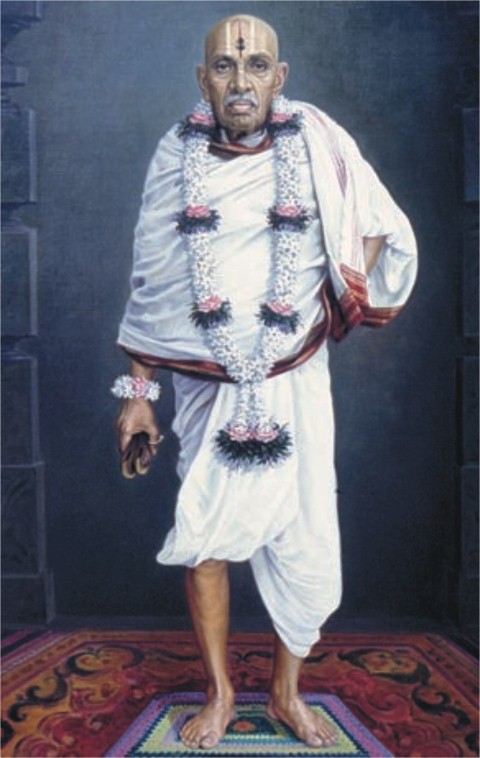
.jpeg)
